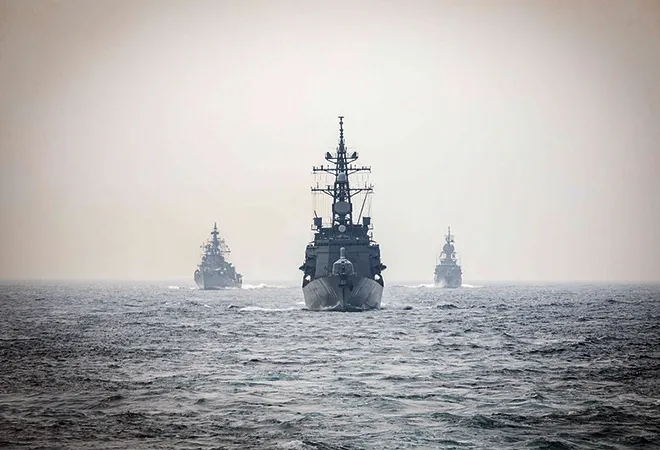
The concept of Security and Growth for All in the Region (SAGAR) was first enunciated by Prime Minister Modi in March 2015. It was put forward as a broad framework for economic revival, trade and investment, connectivity, culture, and harnessing the wealth of the seas. Security was fundamental in this approach, with emphasis on cooperative security and collective action. Speaking at the 2nd Indian Ocean Conference in Colombo on 31 August 2017, Sushma Swaraj, the then Minister for External Affairs, outlined key elements of SAGAR and gave the example of infrastructure projects like the Kaladan to Sittwe multi-modal transport corridor with Myanmar, the trilateral highway with Myanmar and Thailand, and the Chabahar port in Iran. She also mentioned that collective action in the Gulf of Aden, Humanitarian Assistance and Disaster Relief (HADR) operations by India in the region, as well as Exclusive Economic Zone (EEZ) patrols undertaken by the Indian Navy for the Maldives, Seychelles, and Mauritius, were aligned to this concept.
Building on the concept of SAGAR, the Indian vision for Indo-Pacific was outlined by PM Modi at the Shangri-La Dialogue in June 2018. This was followed by the Indo-Pacific Oceans Initiative (IPOI), launched by the Indian PM in November 2019, at the 14th East Asia Summit, with focus on ‘safe, secure, and stable maritime domain.’ The Indian PM linked IPOI with SAGAR during his address at the 17th ASEAN-India summit in November 2020. While confronting numerous challenges posed by the ongoing pandemic, India has moved swiftly to make headway under the seven pillars outlined in IPOI — maritime security; maritime ecology; maritime resources; capacity building and resource sharing; disaster risk reduction and management; science, technology and academic cooperation; and trade, connectivity and maritime transport. Each pillar is considered important, critical and interlinked with other pillars, with the indisputable intent that all pillars will eventually facilitate, support, and strengthen the first one, i.e., maritime security.
The Indian PM linked IPOI with SAGAR during his address at the 17th ASEAN-India summit in November 2020.
The transition from the cryptic concept of SAGAR to a more comprehensive articulation under IPOI, in five years, has been accompanied by a major shift in posturing, policy, and relationships by India. The period has witnessed a significant churn in the geopolitical and geoeconomic environment, and consequently, the salience of the Indo-Pacific region. During the period, many other countries too have spelt out their respective vision or initiative or strategy for the Indo-Pacific, with some common themes and convergent thought processes. These include the US, ASEAN, Japan, Australia, France, and Germany. More countries are expected to do so in the coming months.
In parallel, since its formal inception in 2017, the Quad (India, Japan, Australia, and the US) has attempted to enhance consensus on the broader framework. It has outlined commitment to ‘upholding a rules-based international order, underpinned by respect for territorial integrity and sovereignty, rule of law, transparency, freedom of navigation in the international seas, and peaceful resolution of disputes.’ Defence cooperation between India and Quad members has seen an upswing. Naval exercises between Quad members have further enhanced cooperation, and new Quad plus exercises, involving key partners, are being considered. Exercises conducted, and being planned, have been valuable but the group now seeks to develop a framework for cooperation and assistance in the Indo-Pacific, based on mutually accepted values and norms, and to prevent unilateral and aggressive approaches. It has propounded the concept of ‘many belts and many roads,’ with accent on development cooperation, emerging and critical technologies, resource management including rare earths, infrastructure, resilient supply chains with associated logistics, healthcare, and disaster management. The evolving framework is unique, with multi-dimensional cooperation for growth and development being a fundamental principle, which in turn is intended to strengthen maritime security. It emphasises that a strong network of cooperation can limit the scope for crisis and conflict. It recognises that a broad and generally accepted strategy will evolve, and does not require to be thrust upon participants. Evidently, the central challenge will be to balance idealism with realism, and to develop a common, coherent approach while accepting that many participants will also continue to adopt distinctive, self-interest-based approaches for the foreseeable future.
Exercises conducted, and being planned, have been valuable but the group now seeks to develop a framework for cooperation and assistance in the Indo-Pacific, based on mutually accepted values and norms, and to prevent unilateral and aggressive approaches.
The maiden Quad summit, held virtually on 12 March 2021, had well-coordinated statements from President Joe Biden, PM Narendra Modi, PM Scott Morrison, and PM Yoshihide Suga, highlighting again the importance of a ‘free, open, inclusive and resilient Indo-Pacific.’ Towards concrete and practical steps for the Indo-Pacific region, three working groups were also announced — Quad Vaccine Expert Group (wherein American vaccines would be manufactured in India with Japanese funding and Australian logistic support), Quad Critical and Emerging Technology Working Group (to focus on design, development, standards, and diversification in critical areas, based on shared interests and values), and Quad Climate Working Group (to coordinate implementation of the Paris Agreement in the region). These announcements are significant as they are first steps at the summit level towards a new framework for partnerships for the region.
The main thrust areas of Quad, SAGAR, IPOI, and vision/strategy of some key nations are, cooperative security and mutually beneficial growth. The concept (or strategy) of cooperative security can be traced back through the history of diplomatic relations, and has constantly evolved over time. At the heart of this concept is the premise that peace is indivisible. There are many definitions and interpretations, but broadly it implies states with strategic interdependence working together, with common understanding, to deal with threats and challenges. Its appeal has increased in recent times, as concepts of collective security, blocs, alliances, and security guarantees have significantly waned in relevance. During the Cold War, dominant theme was collective security through deterrence and containment, with threat of counteraction and strong military response. Since the early ’90s, cooperation through politico-military arrangements and instruments (treaties, confidence, and security building mechanisms, etc.) gained prominence. The proposition of development-linked or development-driven cooperative security is relatively new. As expected, it has and continues to face headwinds due to the ‘strategy of hedging’ being adopted by many, wherein states cooperate with one set of countries for security, another set for trade and commerce, and yet another set for environmental and other concerns. ‘Realists’ consider the new model of cooperative security to be inadequate and illusory, and stress upon its inherent contradictions. However, given the current geostrategic and geoeconomic environment in the Indo-Pacific, there is no other viable alternative strategy to strengthen peace, security, and stability. If cooperative security cannot offer a complete solution, it can be complimentary, thereby, providing a higher level of strategic stability and a lower level of coercion and assertiveness. It can also act as a counterweight to prevent the coexistence of globalisation and protectionism turning pernicious.
Given the current geostrategic and geoeconomic environment in the Indo-Pacific, there is no other viable alternative strategy to strengthen peace, security, and stability.
Cooperation for growth agenda, with focus on investment, consumption, trade, technology, capital flows, and financial stability has many models, and numerous challenges have been evident in the recent past. The security implications of US–China economic relations have long been analysed, with many holding the view that the outcome has been very different from what was anticipated. Similarly, relative mutual benefits of Chinese economic engagement in the region have been a subject of debate, with additional concerns related to their impact on the security environment. Many thorny issues, including impact of increased trade on local production and economic activity, management of respective trade balance, and depletion of revenues due to proposed tariff reductions have been at the centre stage in the discussions on Regional Comprehensive Economic Partnership (RCEP). It is only through transparency, dialogue, accommodation, and clearly identified benefits for participants that trust for such cooperation can be built and potential pitfalls minimised. Quad can enable this approach for economic engagement, by becoming the core around which issue-based partnerships can be developed.
New vulnerabilities and increased transnational threats require enlightened cohesion, which can come about only through mutual accommodation and collaboration. Multidimensional development-linked cooperation, as initiated by Quad, should be seen by countries in the region as an enabler to harmonise domestic structural reforms with a secure and enabling external environment of trade, investment, technology, and capital flows. Stronger partnerships for growth and security, based on commonly held rules and norms, and leveraging convergence in the approaches to Indo-Pacific, would strengthen multilateral institutions, enable improved levels of security, stability, and prosperity, and lend more credibility to various initiatives underway. While taking this novel concept of development-linked cooperative security forward, Quad should ensure timely outcomes by the working groups that were announced. It should also work to build wider acceptance of this framework in the Indo-Pacific and endeavour to bring increased alignment between trilateral and bilateral arrangements within the Quad. At the same time, it should work to allay apprehensions, suspicions, and distrust to make this new framework for Indo-Pacific truly free, open, and inclusive.
The views expressed above belong to the author(s). ORF research and analyses now available on Telegram! Click here to access our curated content — blogs, longforms and interviews.




 PREV
PREV


